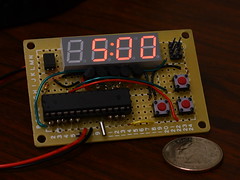I’ve been blogging about writing for almost four years (!), so I probably have some gems lurking in the archives. I picked the most popular post from January 2010 to share today. This post was originally part of the series on Tension, Suspense and Surprise, which I recently released as a free PDF!
Surprise and suspense might seem like polar opposites to be included in the same series. After all, one is all about making promises and putting off their fulfillment, while the other comes out of nowhere. But really, I think they’re just two ways of handling all the new information you’ll give readers in a story—and in some ways, they’re just opposite ends of a spectrum.
You’ve got a huge event coming in your novel, and you have two choices. You can lead up to it with a lot of anticipation, promises, foreshadowing and/or dramatic irony—building suspense. Or you can throw your readers for a loop and just drop it on them (though at least a little foreshadowing is usually good here—hence the  spectrum).
spectrum).
Alfred Hitchcock has famously explained the difference (emphasis added):
There is a distinct difference between ‘suspense’ and ‘surprise’, and yet many pictures continually confuse the two. I’ll explain what I mean.
We are now having a very innocent little chat. Let us suppose that there is a bomb underneath this table between us. Nothing happens, and then all of a sudden, ‘Boom!’ There is an explosion. The public is surprised, but prior to this surprise, it has seen an absolutely ordinary scene, of no special consequence. Now, let us take a suspense situation. The bomb is underneath the table, and the public knows it, probably because they have seen the anarchist place it there. The public is aware that the bomb is going to explode at one o’clock and there is a clock in the décor. The public can see that it is a quarter to one. In these conditions this same innocuous conversation becomes fascinating because the public is participating in the scene.
The audience is longing to warn the characters on the screen: ‘You shouldn’t be talking about such trivial matters. There’s a bomb underneath you and it’s about to explode!’
In the first case we have given the public fifteen seconds of surprise at the moment of the explosion. In the second case we have provided them with fifteen minutes of suspense. The conclusion is that whenever possible the public must be informed. Except when the surprise is a twist, that is, when the unexpected ending is, in itself, the highlight of the story.
—Hitchcock by François Truffaut, p 79-80, as quoted by senses of cinema
Not to disagree with my good friend Alfred, but both surprise and suspense are important. For major events and big promises, suspense is generally better. But for smaller events—especially things that don’t need the extra explaining and won’t live up to the level of suspense—surprise is a great thing.
If we lead up to all the events in a story, we run the risk of being too predictable. If we lead up to none of them, our readers are more likely to experience PTSD than suspense. One is probably better for your event and your story.
How do you determine whether your event should be a surprise or be used to create suspense? Hitchcock’s guideline is a starting place: if it’s a twist ending, surprise is pretty dang important. On the other hand, if that surprise would heighten the suspense throughout the book (without dragging it out too much) and if you can set it up for the audience to know without informing the characters, you could think about whether you could use the extra layer of suspense.
Conversely, consider whether you spend too long building up to minor events—what if you cut all the foreshadowing? Would the reader be slighted or delighted when the surprise is sprung?
What do you think? How do you decide whether an event will be used for suspense or surprise? Come join the conversation!
Photo by Jeremy Stanley


I agree about both being important. Surprise can be fun if handled well, but you can be one edge and still jump in your seat even when anticipating things in a film.
I think of suspense as what I know is going to happen, as the author, and surprise as what I don’t know is going to happen. Last night, one of my characters just up and threw a knife at the other one. Out of the blue. THEN they finally got romantic, which had been leading along for chapters, without coming to anything.
Probably a bit simplistic, but I thought of it when I read this.